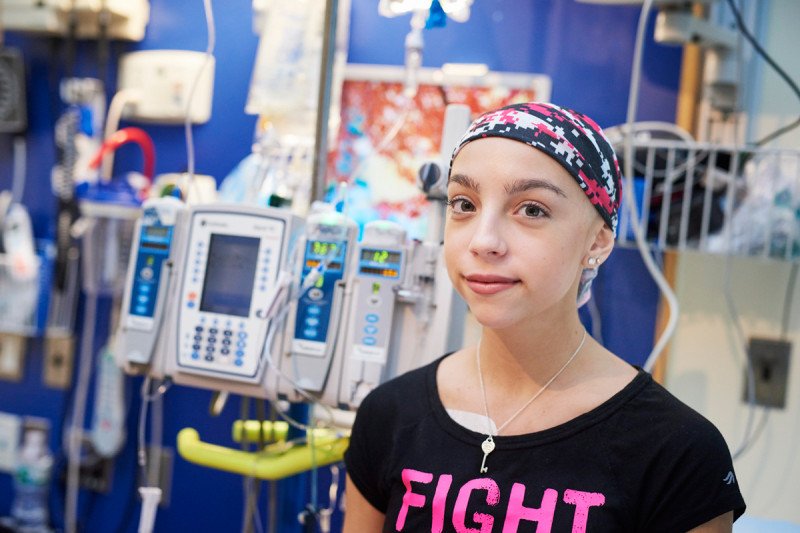
We tailor chemotherapy treatment to each of our young patients.
Our unparalleled expertise in childhood cancer means that we offer our patients the latest, most advanced treatments.
If we determine that chemotherapy is the best treatment choice for your child, your care team knows which specific drugs will be most effective. While your doctor can speak on the specifics about your child’s care plan, here are a few frequently asked questions.
1. What is chemotherapy?
Chemotherapy is a cancer treatment approach that uses medicine to destroy cancer cells or stop or slow down their spread. You may hear it referred to as systemic therapy. This means the medicine circulates throughout the body to treat cancer cells wherever they may be. Depending on various factors, chemotherapy can cure or control your child’s cancer or help ease the symptoms that he or she may be having.
There are many different chemotherapy drugs. If our doctors recommend chemotherapy for your child, we’ll create a personalized treatment plan that gives him or her the best chance for success.
2. How can chemotherapy help my child?
If chemotherapy is a part of your child’s treatment plan, your care team will explain why it’s a good choice for him or her. For cancers that affect the blood or the lymphatic system, including leukemia and lymphoma, chemotherapy may be the only treatment option that makes sense. Other reasons for including chemotherapy in a treatment plan include:
- destroying any cancer cells that might be left in your child’s body after radiation or surgery (called adjuvant treatment)
- shrinking tumors before surgery or radiation therapy (called neoadjuvant treatment)
- treating cancer that has come back (recurred) or spread (metastasized) to other parts of your child’s body
- boosting the effect of radiation therapy
- easing or lessening the intensity of your child’s cancer symptoms by shrinking tumors that are pushing against or putting pressure on parts of the body
3. How is chemotherapy given?
At MSK, we give chemotherapy in several ways. These include:
- intravenously (IV), with the drug delivered into your child’s vein through a thin tube called a catheter
- orally in the form of tablets, pills, or capsules that your child can swallow
- by injection with a shot in a muscle or below your child’s skin
- topically in the form of a cream applied to your child’s skin
- intrahepatically, with the drug delivered into the hepatic artery, which sends blood directly into the liver
- by intraperitoneal injection into the abdominal cavity
- intrathecally, with the drug delivered into the fluid-filled space between the thin layers of tissue that cover the brain and spinal cord
If your child is receiving chemotherapy intravenously, the doctor may recommend inserting a special device called a port (like an artificial vein) into the chest wall under the skin. It can safely remain in place long-term if needed. If your care team recommends using a port to deliver treatment, your doctor will explain why it would help your child, how and where it will be placed, how to care for it, how long it might be needed, how it’s removed, and any potential risks involved. We’ll answer all your questions to help you make an informed decision.
4. How is pediatric chemotherapy different from adult chemotherapy?
We use some of the same chemotherapy medicines for children and adults. No matter which medicine we recommend, we precisely calculate the proper dose based on factors unique to your child. This ensures that he or she is getting exactly the right amount of treatment at the right time.
5. What are the side effects of chemotherapy?
Chemotherapy has come a long way. Despite that, children sometimes experience side effects. This happens because chemotherapy attacks healthy cells as well as cancerous ones. Side effects can vary and can be short- or long-term. If your child does experience side effects, we will do our very best to minimize and manage them. In some cases, we may modify the medicine’s dosage or how it is given.
6. Will my child lose his or her hair?
Most likely, yes. But hair usually grows back within a few months of completing chemotherapy.